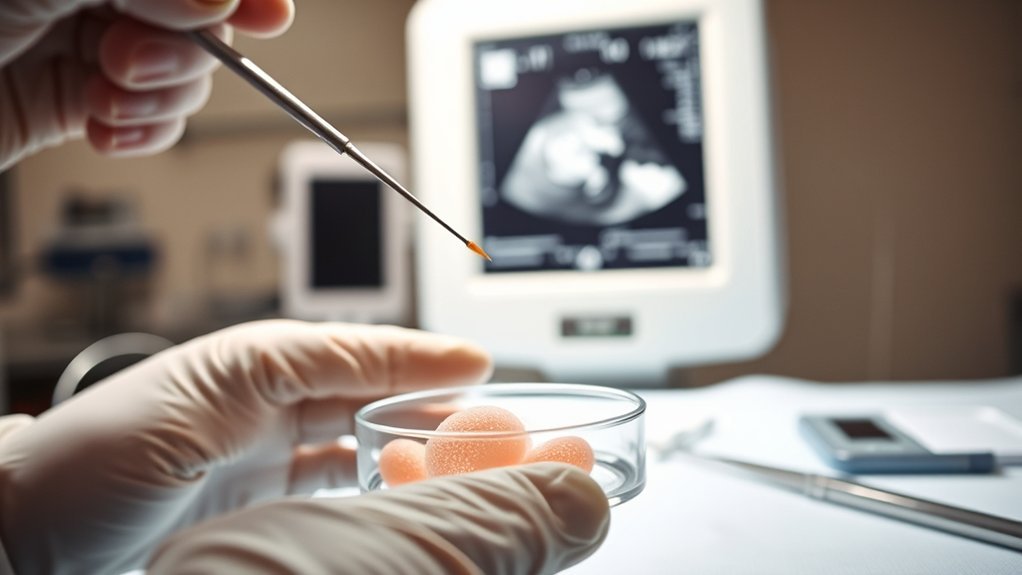If you’re worried about the safety of Chorionic Villus Sampling (CVS), rest assured it’s a common and well-regarded procedure. You might have questions about how it works and what to expect during the process. By understanding each step, you can feel more prepared and confident. Let’s walk through the essentials of CVS, from preparation to recovery, ensuring you’re informed every step of the way.
Understanding Chorionic Villus Sampling (CVS)
Chorionic Villus Sampling (CVS) is a prenatal test that allows you to gather essential information about your baby’s genetic health early in pregnancy.
Typically performed between 10 and 13 weeks of gestation, CVS involves taking a small sample of the placenta, which shares your baby’s genetic material. This test can identify genetic disorders, such as Down syndrome and cystic fibrosis, providing vital insights into your baby’s health.
CVS, conducted between 10 and 13 weeks, samples the placenta to detect genetic disorders, offering crucial insights into your baby’s health.
The procedure can be done through your cervix or abdomen, and results usually arrive within a week. CVS offers a risk assessment, helping you make informed decisions as you navigate your pregnancy.
Understanding CVS is key to ensuring you and your healthcare provider can address any potential concerns effectively.
Preparing for the CVS Procedure
Preparing for the CVS procedure can feel overwhelming, but being well-informed can ease your concerns. Here are some steps to help you get ready:
- Consult with your healthcare provider: Discuss your medical history and any questions you have.
- Understand the procedure: Familiarize yourself with what CVS entails to reduce anxiety.
- Plan for aftercare: Arrange for someone to drive you home after the procedure.
- Follow fasting instructions: If given, make sure to adhere to any dietary restrictions prior to your appointment.
- Gather support: Talk to your partner or a friend about your feelings and fears; having support can make a big difference.
Taking these steps can help you feel more prepared and confident as you approach the CVS procedure.
The CVS Procedure: What to Expect
As you arrive for the CVS procedure, you can expect a calm and supportive environment.
You’ll check in and may need to change into a gown. A healthcare professional will explain the procedure, ensuring you feel comfortable and informed.
You’ll lie down on an examination table, and the doctor will use an ultrasound to locate the placenta. Depending on your situation, they may use either a thin needle (transabdominal) or a small tube (transcervical) to collect tissue samples.
You might feel some pressure or mild discomfort during the process, but it’s usually brief. The entire procedure typically lasts about 10 to 15 minutes.
Afterward, you’ll be monitored briefly before you can go home.
Recovery After CVS: Guidelines and Care
After completing the CVS procedure, it’s important to prioritize your recovery.
Taking care of yourself in the days following the procedure can help guarantee a smooth healing process. Here are some guidelines to follow:
Prioritizing self-care after the procedure is essential for a smooth recovery. Follow these guidelines to aid healing.
- Rest for the remainder of the day after the procedure.
- Avoid strenuous activities or heavy lifting for at least 48 hours.
- Monitor for any unusual symptoms, like severe cramping or bleeding.
- Stay hydrated and maintain a balanced diet to support healing.
- Follow up with your healthcare provider if you have any concerns.
Interpreting CVS Results and Next Steps
Once you receive the results of your chorionic villus sampling (CVS), it’s crucial to understand what they mean for your pregnancy and any potential next steps.
If your results show no abnormalities, you can continue your pregnancy with reassurance. However, if they indicate a genetic condition or abnormality, it’s important to discuss these findings with your healthcare provider.
They’ll help you understand the implications and may recommend further testing, such as amniocentesis, for confirmation. You might also consider consulting a genetic counselor for support and guidance.
They can help you navigate your options, including potential interventions or preparations for your baby’s care.
Whatever the outcome, remember you’re not alone; support is available.
Frequently Asked Questions
Is CVS Safe for Both Mother and Baby?
CVS is generally safe for both you and your baby, but like any medical procedure, it carries some risks. It is crucial to discuss potential complications with your healthcare provider to make an informed decision.
Can CVS Be Performed During Any Stage of Pregnancy?
No, CVS can’t be performed at any stage of pregnancy. It’s typically done between 10 and 13 weeks. Performing it earlier or later isn’t recommended due to increased risks and potential complications for you and your baby.
What Are the Risks of CVS Compared to Amniocentesis?
CVS carries a slightly higher risk of miscarriage compared to amniocentesis, especially when performed early in pregnancy. However, both procedures pose risks, including infection and complications, so discussing concerns with your doctor is essential.
How Accurate Are CVS Results for Genetic Disorders?
CVS results for genetic disorders are about 98-99% accurate. However, it’s crucial to discuss potential limitations and false positives with your healthcare provider to guarantee you fully understand the implications of the results.
Will Insurance Typically Cover the Cost of CVS?
Insurance often covers CVS, but it varies by plan. You should check with your provider to confirm coverage specifics, including any copays or deductibles, to avoid unexpected out-of-pocket expenses during the process.
Conclusion
To summarize, CVS can be a valuable tool for evaluating your baby’s genetic health early in pregnancy. By understanding the procedure and following recovery guidelines, you can help guarantee the best outcomes. For instance, Sarah, who had CVS at 11 weeks, felt reassured knowing her baby’s health was being monitored. After a few days of rest and careful observation, she received normal results, allowing her to enjoy her pregnancy with peace of mind.
